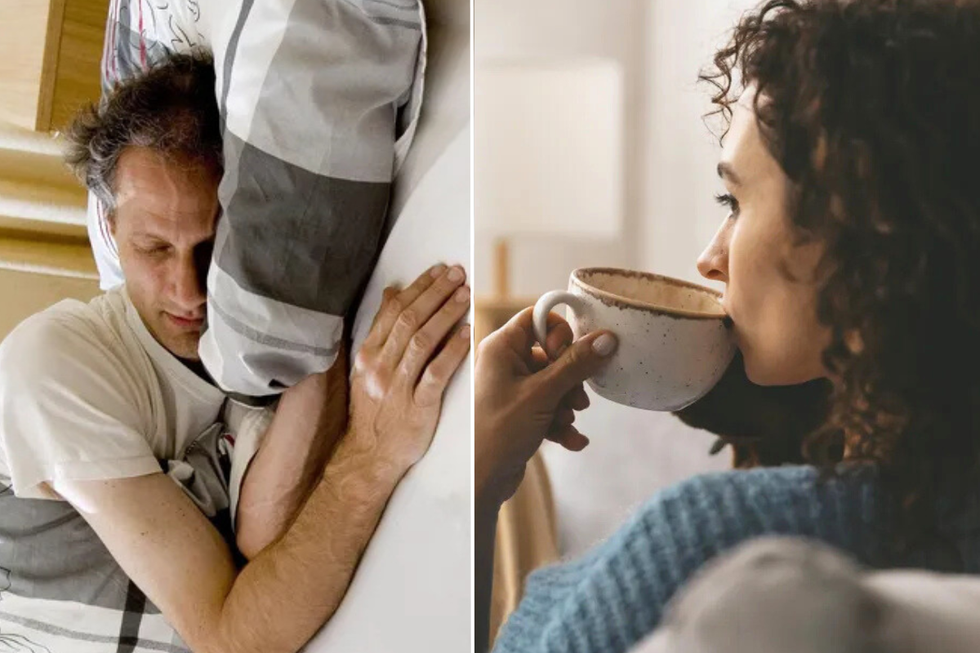Sarra Gray
Guest Reporter
Sleep deprivation is the UK's leading cause of stress, with a staggering 41 per cent of adults citing tiredness as their primary source of anxiety, overtaking concerns about finances, work, and family matters.
Those who are left tossing and turning at night have been given some important advice, including why an afternoon drink could be the cause of their sleepless nights.
The pattern begins when anxiety prevents individuals from achieving deep, restful sleep. This poor-quality sleep then makes it harder to cope with daily challenges.
As sleep quality deteriorates, stress levels rise further, perpetuating the cycle of exhaustion and worry. Quality sleep has been identified as crucial for breaking this destructive loop, allowing both mind and body to properly recharge and better manage daily stressors.

As concerns about sleep quality continue to impact British adults, Chris Tattersall, sleep environment expert and managing director of Woolroom, has stepped forward with practical solutions to help break the stress-sleep cycle.
Cut the caffeine
Firstly, avoid late-day caffeine consumption, which can significantly disrupt sleep patterns.
Chris warned: "Whilst that coffee at 4pm may seem like a good way to keep going until the end of the day, caffeine stays in your body for up to 15 hours after consumption."
Reduce screen time
The expert also advised against late-night screen time as it can interfere with natural sleep cycles.
"Phones and laptops not only emit blue light, which mimics daylight and suppresses melatonin (the sleepy hormone), but they also often keep us connected to stressors, such as work, and make it difficult to unwind," he said.
Instead, avoid both caffeine and screens for at least an hour before bedtime to promote better sleep quality.
Establish a Sleep Routine
"Maintaining a bedtime and wake-up schedule is one of the most crucial improvements you can make to your sleep quality," Chris advised.
He explained that consistency helps regulate your internal clock, making it easier to both fall asleep and wake up refreshed.
Choose the Right Bedding
Natural materials play a crucial role in sleep quality, particularly for those experiencing stress-induced night sweats.
He said: "Natural options, such as wool duvets and wool mattresses are hypoallergenic and will regulate your temperature as you sleep."
Create Your Sleep Environment
Try a flexible approach to bedroom conditions, as complete darkness and silence aren't always optimal for stressed individuals.
He said: "If you're stressed, I would recommend trying a plug-in night light and some white noise to help distract your mind and drift off more easily."
Choose breathable materials for bedding and sleepwear to maintain comfortable temperature regulation throughout the night.
LATEST DEVELOPMENTS

Stay Active for Better Sleep
Regular physical activity plays a vital role in both stress reduction and sleep quality improvement, according to the expert.
He explained: "When you're stressed it can be difficult to feel motivated to exercise, but regular movement is so important for your overall health and your sleep quality."
Exercise helps lower stress hormones such as cortisol while simultaneously releasing endorphins.
"These are natural mood boosters that reduce feelings of anxiety, help with sleep quality and are also known as the body's natural painkillers."
Find Out More...
Those who are left tossing and turning at night have been given some important advice, including why an afternoon drink could be the cause of their sleepless nights.
The pattern begins when anxiety prevents individuals from achieving deep, restful sleep. This poor-quality sleep then makes it harder to cope with daily challenges.
As sleep quality deteriorates, stress levels rise further, perpetuating the cycle of exhaustion and worry. Quality sleep has been identified as crucial for breaking this destructive loop, allowing both mind and body to properly recharge and better manage daily stressors.

As concerns about sleep quality continue to impact British adults, Chris Tattersall, sleep environment expert and managing director of Woolroom, has stepped forward with practical solutions to help break the stress-sleep cycle.
Cut the caffeine
Firstly, avoid late-day caffeine consumption, which can significantly disrupt sleep patterns.
Chris warned: "Whilst that coffee at 4pm may seem like a good way to keep going until the end of the day, caffeine stays in your body for up to 15 hours after consumption."
Reduce screen time
The expert also advised against late-night screen time as it can interfere with natural sleep cycles.
"Phones and laptops not only emit blue light, which mimics daylight and suppresses melatonin (the sleepy hormone), but they also often keep us connected to stressors, such as work, and make it difficult to unwind," he said.
Instead, avoid both caffeine and screens for at least an hour before bedtime to promote better sleep quality.
Establish a Sleep Routine
"Maintaining a bedtime and wake-up schedule is one of the most crucial improvements you can make to your sleep quality," Chris advised.
He explained that consistency helps regulate your internal clock, making it easier to both fall asleep and wake up refreshed.
Choose the Right Bedding
Natural materials play a crucial role in sleep quality, particularly for those experiencing stress-induced night sweats.
He said: "Natural options, such as wool duvets and wool mattresses are hypoallergenic and will regulate your temperature as you sleep."
Create Your Sleep Environment
Try a flexible approach to bedroom conditions, as complete darkness and silence aren't always optimal for stressed individuals.
He said: "If you're stressed, I would recommend trying a plug-in night light and some white noise to help distract your mind and drift off more easily."
Choose breathable materials for bedding and sleepwear to maintain comfortable temperature regulation throughout the night.
LATEST DEVELOPMENTS
- How to sleep better: Britons told a quick breathing technique to help get a good night's sleep
- What time to stop eating at night for a 'deep sleep' - 'Turn off your digestive system'
- Britons told how to get the optimum body temperature for a perfect night's sleep

Stay Active for Better Sleep
Regular physical activity plays a vital role in both stress reduction and sleep quality improvement, according to the expert.
He explained: "When you're stressed it can be difficult to feel motivated to exercise, but regular movement is so important for your overall health and your sleep quality."
Exercise helps lower stress hormones such as cortisol while simultaneously releasing endorphins.
"These are natural mood boosters that reduce feelings of anxiety, help with sleep quality and are also known as the body's natural painkillers."
Find Out More...
